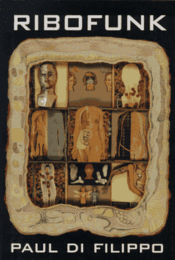- Biopunk
-
Biopunk (a portmanteau synthesizing "biotechnology" and "punk") is a term used to describe:
- A hobbyist who experiments with DNA and other aspects of genetics.[1][2]
- A technoprogressive movement advocating open access to genetic information.[3][4]
- A science fiction genre that focuses on biotechnology and subversives.[5]
Contents
Biohacker
Biopunk is a synonym for biohacker[citation needed], a term used to describe a hobbyist who experiments with DNA and other aspects of genetics.[1][2] A biohacker (or "wetware hacker") is similar to a computer hacker who creates and modifies computer software or computer hardware as a hobby, but should not be confused with a bioterrorist, whose sole intent is the deliberate release of viruses, bacteria, or other germs used to cause illness or death in people, animals, or plants (in the same way a computer hacker should not be confused with the more popular, yet erroneous, use of the term, describing someone who spreads computer viruses or breaks into computers systems for malicious purposes).[6]
Pat Mooney, executive director of ETC Group, is a critic of biohacking who argues that—using a laptop computer, published gene sequence information, and mail-order synthetic DNA—just about anyone has the potential to construct genes or entire genomes from scratch (including those of the lethal pathogens) in the near-future. He warns that the danger of this development is not just bio-terror, but "bio-error".[7]
Movement
The biopunk movement is a small intellectual and cultural movement, which encompasses a growing number of scientists, artists, and cultural critics who are organizing to create public awareness of how genomic information, produced by bioinformatics, gets used and misused. On the basis of a presumed parallel between genetic and computational code, science journalist Annalee Newitz has called for open-sourcing of genomic databases and declared that "Free our genetic data!" is the rallying cry of the biopunk.[3][4] Biological Innovation for Open Society is an example of an open-source initiative in biotechnology aiming to apply open license for biological innovation.[8]
Self-described "transgenic artist" Eduardo Kac uses biotechnology and genetics to create provocative works that concomitantly revel in scientific techniques and critique them. In what is likely his most famous work, Alba, Kac collaborated with a French laboratory to procure a green-fluorescent rabbit: a rabbit implanted with a green fluorescent protein gene from a type of jellyfish in order for the rabbit to fluoresce green under ultraviolet light.[3] The members of the Critical Art Ensemble have written books and staged multimedia performance interventions around this issue, including The Flesh Machine (focusing on in vitro fertilisation, surveillance of the body, and liberal eugenics) and Cult of the New Eve (analyzing the pseudoreligious discourse around new reproductive technologies).[9] Contributors to Biotech Hobbyist Magazine have written extensively on the field.[10]
Biologist, speculative-fiction author, and self-described biopunk, Meredith L. Patterson is known for her work on yogurt bacteria within the DIYbio community, as well as being the author of "A Biopunk Manifesto",[11][12] which she delivered at the UCLA Center for Society and Genetics' symposium, "Outlaw Biology? Public Participation in the Age of Big Bio". This manifesto is modeled after "A Cypherpunk Manifesto" by Eric Hughes, which states the goals of the cypherpunk movement. The influence of the cypherpunks (a cyberpunk derivative like the biopunk subculture) on the biopunk community does not end there; Patterson's husband and long-time collaborator Len Sassaman was a cypherpunk contemporary of Hughes. Patterson and Sassaman have worked together on a number of biohacking projects and heavily promoted the continued legality of citizen science, both on moral and practical grounds.[13][14]
The biopunk movement is also a political dissident movement to the extent that the arrest and prosecution of some members for their work with harmless microbes, such as artivist Steve Kurtz, has been denounced as political repression by critics who argue the U.S. government has used post-9/11 anti-terrorism powers to intimidate artists and others who use their art to criticize society.[15]
Science fiction
Biopunk science fiction is a subgenre of cyberpunk fiction that focuses on the near-future unintended consequences of the biotechnology revolution following the discovery of recombinant DNA. Biopunk stories explore the struggles of individuals or groups, often the product of human experimentation, against a backdrop of totalitarian governments and megacorporations which misuse biotechnologies as means of social control and profiteering. Unlike cyberpunk, it builds not on information technology, but on synthetic biology. Like in postcyberpunk fiction, individuals are usually modified and enhanced not with cyberware, but by genetic manipulation.[5] A common feature of biopunk fiction is the "black clinic", which is a laboratory, clinic, or hospital that performs illegal, unregulated, or ethically-dubious biological modification and genetic engineering procedures.[16] Many features of biopunk fiction have their roots in William Gibson's Neuromancer, one of the first cyberpunk novels.[17]
One of the prominent writers in this field is Paul Di Filippo, though he called his collection of such stories ribofunk, a portmanteau word synthesizing "ribosome" and "funk".[18] In RIBOFUNK: The Manifesto,[19] Di Filippo wrote:
Why Ribo? Cybernetics was a dead science when cyberpunk SF was born, a cul-de-sac without living practitioners. Furthermore, the "cyber" prefix has been irreparably debased by overuse, in vehicles ranging from comic books to bad movies. The tag now stands for nothing in the public mind but computer hacking and fanciful cyborgs such as Robocop. And Weiner's actual texts do not provide enough fruitful metaphors for constructing a systematic worldview. Why Funk? Punk was a dead music when cyberpunk SF was born, a cul-de-sac albeit with living practitioners who just hadn't gotten the message yet. The music's nihilistic, chiliastic worldview had already culminated in its only possible end: self-extinction. What is Ribofunk then? Ribofunk is speculative fiction which acknowledges, is informed by and illustrates the tenet that the next revolution--the only one that really matters--will be in the field of biology. To paraphrase Pope, ribofunk holds that: "The proper study of mankind is life." Forget physics and chemistry; they are only tools to probe living matter. Computers? Merely simulators and modelers for life. The cell is King! [19]
Di Filippo argues that precursors of ribofunk fiction include H. G. Wells' The Island of Doctor Moreau; Julian Huxley's The Tissue Culture King; some of David H. Keller's stories, Damon Knight's Natural State and Other Stories; Frederik Pohl and Cyril M. Kornbluth's Gravy Planet; novels of T. J. Bass and Varley; Greg Bear's Blood Music and Bruce Sterling's Schismatrix.[19]
Books
- Ribofunk by Paul Di Filippo [5][20]
- The Movement of Mountains and The Brains of Rats by Michael Blumlein [21]
- Clade and Crache by Mark Budz [22]
- White Devils by Paul J. McAuley [23][24]
- The Xenogenesis trilogy by Octavia E. Butler [3]
- The Windup Girl by Paolo Bacigalupi [25]
Film and television
See also: Category:Biopunk films- Gattaca (1997) [26]
- Dark Angel (2000) [27]
Computer and video games
Comics and manga
- Doktor Sleepless comic by Warren Ellis [29]
- Fluorescent Black by M.F. Wilson and Nathan Fox[30]
Notes
- ^ a b Katz, J.S.: "Roses are Black, Violets are Green", New Scientist, 6 January 1990
- ^ a b Katz, J.S.: "That which is not Forbidden is Mandatory", BioTech Educ, 4(1), 1990
- ^ a b c d Newitz, Annalee (2001). Biopunk. Archived from the original on 2002-12-20. http://web.archive.org/web/20021220190353/http://www.sfbg.com/SFLife/tech/71.html. Retrieved 2007-01-26.
- ^ a b Newitz, Annalee (2002). Genome Liberation. http://archive.salon.com/tech/feature/2002/02/26/biopunk/print.html. Retrieved 2007-01-26.
- ^ a b c Quinion, Michael (1997). World Wide Words: Biopunk. http://www.worldwidewords.org/turnsofphrase/tp-bio3.htm. Retrieved 2007-01-26.
- ^ Schrage, Michael (1988-01-31). "Playing God in Your Basement". Washington Post.
- ^ ETC Group (January 2007) (PDF). Extreme Genetic Engineering: An Introduction to Synthetic Biology. http://www.etcgroup.org/upload/publication/602/01/synbioreportweb.pdf. Retrieved 2007-02-02.
- ^ "BiOS". http://www.bios.net/daisy/bios/home.html.
- ^ "Critical Art Ensemble". http://www.critical-art.net/.
- ^ "Biotech Hobbyist Magazine". http://www.nyu.edu/projects/xdesign/biotechhobbyist/.
- ^ A Biopunk Manifesto, 2009
- ^ http://www.biopunk.org/maradydd-s-biopunk-manifesto-t336.html
- ^ Tyson Anderson. "Darning Genes: Biology for the Homebody". h+. http://www.hplusmagazine.com/articles/bio/darning-genes-biology-homebody.
- ^ Rise of the Garage Genome Hackers - New Scientist
- ^ http://www.firstamendmentcenter.org/news.aspx?id=19246
- ^ Pulver, David L. (1998). GURPS Bio-Tech. Steve Jackson Games. ISBN 1556343361.
- ^ Paul Taylor. "Fleshing Out the Maelstrom: Biopunk and the Violence of Information". Journal of Media and Culture. http://journal.media-culture.org.au/0006/biopunk.php.
- ^ Fisher, Jeffrey (1996). Ribofunk. http://www.wired.com/wired/archive/4.11/ribopunk_pr.html. Retrieved 2007-01-26.
- ^ a b c Di Filippo, Paul (1998). RIBOFUNK: The Manifesto. http://www.streettech.com/bcp/BCPtext/Manifestos/Ribofunk.html. Retrieved 2011-01-05.
- ^ "This Just In...News from The Agony Column". Trashotron.com. http://www.trashotron.com/agony/news/2005/04-11-05.htm. Retrieved 2008-11-28.
- ^ "Locus Online: Review by Claude Lalumière". Locusmag.com. http://www.locusmag.com/2002/Reviews/Lalumiere05_WonderAnatomy.html. Retrieved 2008-11-28.
- ^ "Science Fiction Book Reviews". Scifi.com. http://www.scifi.com/sfw/issue399/books.html. Retrieved 2008-11-28.[dead link]
- ^ Lalumiere BestOf2004.html
- ^ "White Devils by Paul McAuley - an infinity plus review". Infinityplus.co.uk. http://www.infinityplus.co.uk/fantasticfiction/whitedevils.htm. Retrieved 2008-11-28.
- ^ Grossman, Lev (8 December 2009). "The Windup Girl by Paulo Bacigalupi". Time. http://www.time.com/time/specials/packages/article/0,28804,1945379_1943868_1943887,00.html. Retrieved 29 October 2010.
- ^ "NEUROETHICS | The Narrative Perspectives". Neuroethics.upenn.edu. Archived from the original on 2008-05-31. http://web.archive.org/web/20080531123956/http://neuroethics.upenn.edu/narrative_perspec.html. Retrieved 2008-11-28.
- ^ "Science Fiction News of the Week". Scifi.com. http://www.scifi.com/sfw/issue222/news.html. Retrieved 2008-11-28.[dead link]
- ^ "BioShock for Xbox 360 Reviews - Xbox 360 BioShock Reviews". 2K Games. August 21, 2007. http://www.gamespot.com/xbox360/action/bioshock/player_review.html?id=532056. Retrieved 2008-11-28.
- ^ "Warren Ellis: Modify Your Body But Also Worry About the Planet". Io9.com. http://io9.com/341903/modify-your-body-but-also-worry-about-the-planet. Retrieved 2008-11-28.
- ^ "Genome Alberta Interview". Genome Alberta. http://www.genomealberta.ca/blogs/main_08180801.aspx. Retrieved 2008-08-18.
External links
- The Biopunk Directory, a comprehensive directory of biopunk resources
- Biopunk.org, a community for bio-hackers
- DIYbio.org, a community for DIY biological engineers
- Hackteria.org, a community for bio-artists
- OpenWetWare, an open-source resource for synthetic biology researchers
- OpenPCR, an open-source design for a building a thermal cycler
Cyberpunk Authors and
contributorsDerivative
subgenresDerivative
subculturesCategories:- Biocybernetics
- Bioinformatics
- Biopunk
- Biotechnology
- Cyberpunk subgenres
- Molecular genetics
- Science fiction genres
- Synthetic biology
- Systems biology
- Social movements
Wikimedia Foundation. 2010.


